Every great product has a story waiting to be told. But who transforms complex technologies into messages that capture people’s imagination? Product Marketing Managers are the hidden champions who breathe life into products, turning technical features into compelling narratives that customers can’t resist. If you’ve dreamed of a career that combines strategic thinking, creativity, and the power to shape market perceptions, your journey into Product Marketing Management starts here. This guide is your ultimate roadmap if you want to know how to become a Product Marketing Manager. We’ve packed it with everything you need to know: career paths, essential skills, interview tips, and real-world insights from industry experts.
Table of Contents
Understanding Product Marketing Management
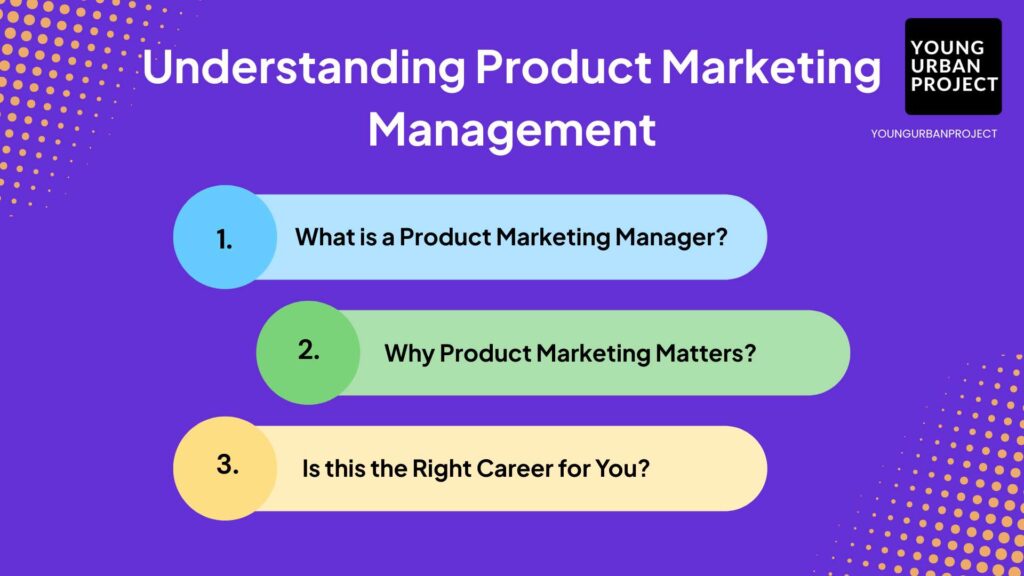
1. What is a Product Marketing Manager?
A Product Marketing Manager is a strategic professional who connects products with the right customers. They are the bridge between product development teams and the market. Their job is to understand customer needs and communicate product value effectively.
2. Why Product Marketing Matters?
Today, having a great product isn’t enough. Companies need experts who can:
- Research and understand market trends
- Define clear product positioning
- Create compelling messaging
- Help products stand out from competitors
- Drive customer adoption and growth
3. Is this the Right Career for You?
Product Marketing offers an exciting career path for professionals who:
- Love storytelling and communication
- Understand technology and market dynamics
- Enjoy solving complex business challenges
- Want to make a direct impact on product success
- Are interested in strategic business roles
The role combines creativity, strategic thinking, and deep market understanding. It’s perfect for those who want to do more than traditional marketing.
The Role of a Product Marketing Manager
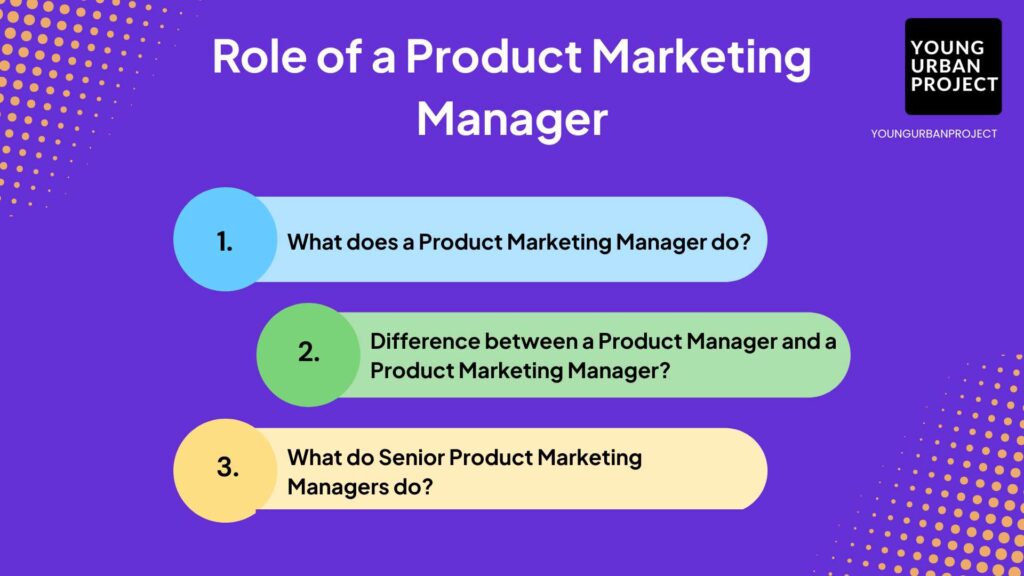
1. What does a Product Marketing Manager do?
PMM’s do many different things. The main job of Product Marketing Manager is to understand the product, the market, and the customers. They create marketing plans. They figure out how to talk about the product. They plan when to launch the product. They also work with sales and other teams to make sure the product does well.
Key responsibilities and daily tasks:
This can involve doing research on the market. They look at what other companies are doing. They figure out who the customers are. They create marketing materials. They plan and carry out product launches. They work with the sales team. And they check how well the marketing is working.
2. What’s the difference between a Product Manager and a Product Marketing Manager?
Both roles are important for a product to succeed. But they focus on different things.
- Responsibilities comparison: Product Managers focus on what the product is. This includes its features and how it will be developed. Product Marketing Managers focus on how to bring the product to the market. They also focus on how to tell customers about its value.
- Career trajectory differences: Product Managers often have backgrounds in engineering or making products. Product Marketing Managers often have backgrounds in marketing, talking to people, or sales.
3. What do Senior Product Marketing Managers do?
When PMMs get more experience, they can become senior PMMs.
- How the role evolves with experience: Senior Product Marketing Managers have more important planning jobs. They often manage a team of PMMs. They also work on bigger product projects.
- Leadership and strategic responsibilities: They are involved in making big decisions. They help plan the overall product strategy. They also work closely with the leaders of the company.
Also Read: Product Marketing vs Conventional Marketing
Qualifications & Skills Needed to Become a Product Marketing Manager
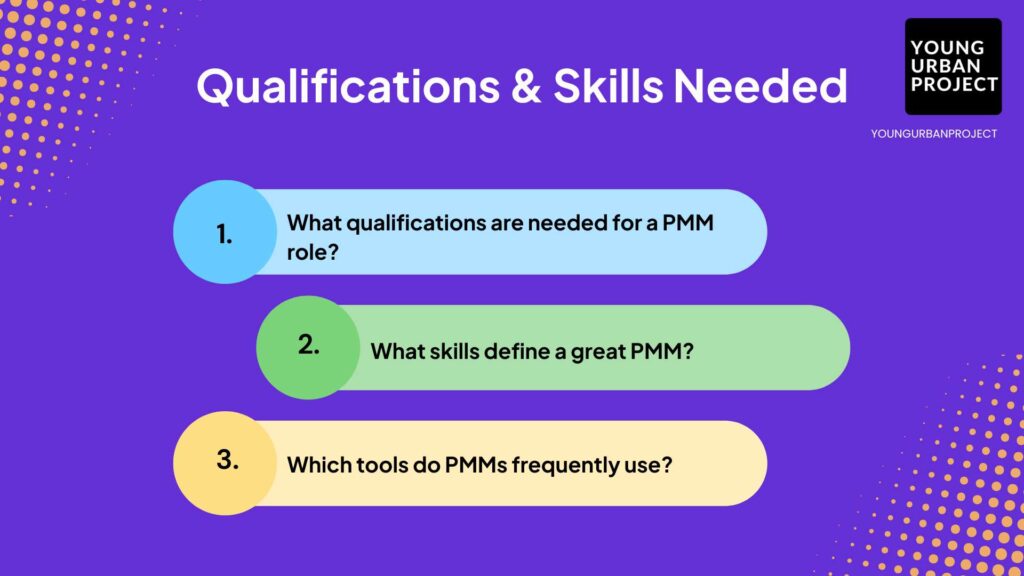
1. What qualifications are needed for a PMM role?
To work as a Product Marketing Manager, some qualifications are usually needed.
- Do you need a degree? Most PMM jobs prefer candidates with a bachelor’s degree. While it’s not always required, having a degree can help you get hired.
- Relevant academic backgrounds: Common degrees for PMMs are in marketing, business, or communication. Sometimes, having a degree in a technical field like computer science can be useful, especially if you’re marketing tech products.
2. What skills define a great PMM?
A good PMM needs a mix of practical skills and personal skills to do well.
Hard Skills: These are skills you learn through training or experience.
- Market research & competitor analysis: Knowing how to find out what customers want and what other companies are selling.
- Messaging & product positioning: Being able to explain what a product does and why customers should choose it over others.
- Go-to-market (GTM) strategy: Planning how to launch a product and get it into the hands of customers.
- Data interpretation & performance tracking: Understanding numbers and using them to see if marketing efforts are working.
- CRM & automation tools: Knowing how to use software to manage customer information and automate marketing tasks, like sending emails.
Also Read: What Is Customer Relationship Marketing
Soft Skills: These are skills about how you think and interact with others.
- Strategic thinking & problem-solving: Being able to think about the bigger picture and find solutions to problems.
- Communication & storytelling: Being able to explain ideas clearly and in an interesting way.
- Collaboration across teams: Working well with different groups in the company, such as the sales team and the product development team.
- Leadership & adaptability: Being able to guide others and change plans when needed.
3. Which tools do PMMs frequently use?
Product Marketing Managers use different tools to help them do their jobs.
- Google Analytics: It helps see how people use websites. Good for understanding customer behavior online.
- SEMrush: It’s for researching keywords and checking competitors. Useful for SEO and content ideas.
- HubSpot: It helps manage customer info and automate marketing. Good for email campaigns and CRM.
- Salesforce: It’s another tool for managing customers. Often used by sales teams too.
- Marketo: It’s for bigger marketing automation. Good for complex campaigns.
- Competitive intelligence platforms: These help track what rivals are doing. Useful for staying ahead.
Also Read: Product Marketing Framework
Certifications
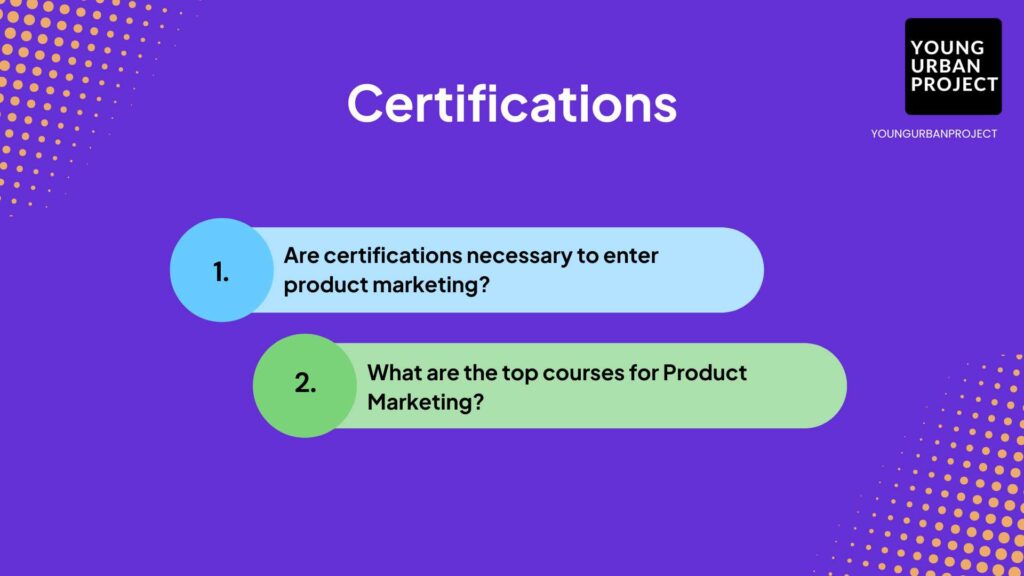
1. Are certifications necessary to enter product marketing?
Certifications are not required to become a Product Marketing Manager, but they can help. They show employers that you have formal training and knowledge. If you are switching careers or lack direct experience, a certification can make you stand out.
Leading PMM certifications
There are many good certifications for product marketing. Some of the best include:
- Product Marketing Alliance (PMA) – Covers product positioning, messaging, and go-to-market strategies.
- Pragmatic Institute – Focuses on product strategy, research, and data-driven marketing.
- HubSpot Content Marketing Certification – Helps with messaging, content creation, and inbound marketing.
Do certifications add value?
Certifications can improve your understanding of product marketing concepts. They also help you build credibility when applying for jobs. Practical experience helps you handle real product development challenges, like positioning, messaging, and customer engagement, more confidently and effectively.
2. What are the top courses for Product Marketing?
Learning product marketing through courses can give you practical skills. Many online courses offer insights from industry experts and real-world case studies.
Free & premium resources for upskilling
There are many ways to learn product marketing, including free guides, online courses, and mentorship programs.

One great option is the Young Urban Project Product Marketing Course. It provides hands-on learning and real-life case studies to help you build the right skills. Whether you are new to product marketing or looking to grow, this course can guide you.
You can also explore Young Urban Project for other marketing and growth-focused learning programs. These courses help professionals develop practical skills that they can apply immediately.
Other useful platforms for learning include:
- Udemy – Various beginner-friendly and advanced courses.
- LinkedIn Learning – Short, industry-relevant courses on marketing and strategy.
- Reforge – Advanced programs for experienced marketers.
Picking the right course depends on your experience level and career goals. A mix of certifications, practical learning, and real-world projects will prepare you for success in product marketing.
Also Read: What is a Market Requirements Document ?
Learning Paths
1. How to Become a Product Marketing Manager in 6 Simple Steps
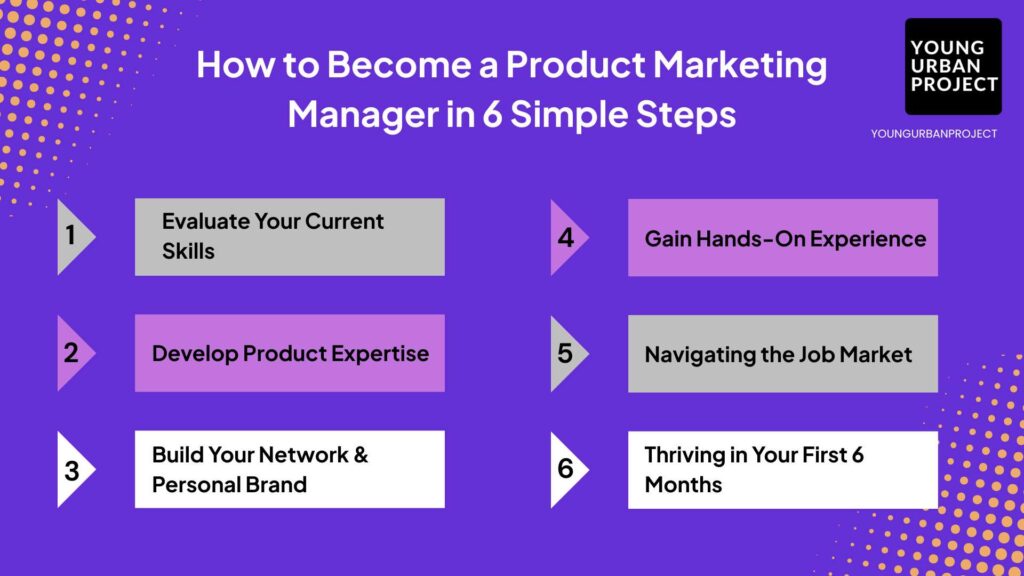
Where should you start?
Becoming a Product Marketing Manager (PMM) takes time, effort, and the right skills. If you’re starting fresh or switching from another role, follow these steps to build a strong foundation.
Step 1: Evaluate Your Current Skills
Before you dive in, assess what skills you already have.
Transferable skills from other roles
Many PMMs come from backgrounds like sales, content marketing, customer success, or business strategy. If you have experience in these areas, you already have valuable skills. These include:
- Understanding customer needs
- Communicating product benefits
- Market research and competitive analysis
- Storytelling and messaging
Addressing skill gaps
If you’re missing some key PMM skills, don’t worry. Identify where you need improvement and start learning. You can take courses, read case studies, or get hands-on experience through small projects.
Step 2: Develop Product Expertise
To market a product well, you need to understand how it works and how customers use it.
Understanding product positioning & lifecycle
Product positioning helps define why a product is valuable and how it stands out from competitors. Learn about:
- How companies position their products
- Different stages of a product’s lifecycle (launch, growth, maturity, decline)
- How pricing, messaging, and marketing evolve over time
Case study learnings from real brands
Studying successful brands can teach you a lot. Look at how top companies launch new products, build demand, and communicate their value. Some well-known case studies include:
- Apple’s product launches
- Tesla’s unique marketing strategy
- Nike’s storytelling approach
Step 3: Build Your Network & Personal Brand
Networking can help you learn from experts, find job opportunities, and get noticed in the industry.
Leveraging LinkedIn, X & industry forums
Social media is a powerful tool for career growth. You can:
- Follow PMM professionals and learn from their insights
- Share your thoughts on product marketing topics
- Engage with industry discussions and trends
Joining PMM communities
There are many online groups where product marketers share knowledge and job opportunities. Some great places to start:
- Product Marketing Alliance (PMA) – A global community for PMMs
- Slack groups like Product Marketing Insiders
- Reddit & Quora discussions on product marketing
Also Read: Product Marketing vs Service Marketing
Step 4: Gain Hands-On Experience
Practical experience is crucial. Employers want to see that you can apply product marketing concepts in real situations.
Internal job shifts & side projects
If you already work at a company, look for opportunities to move into a PMM role. You can:
- Take on product marketing tasks in your current role
- Volunteer to help with messaging, content, or GTM strategies
- Collaborate with the product team to understand their needs
Working with startups or freelance gigs
Startups often need marketing help but may not have big budgets. This is a great opportunity to gain experience by:
- Helping a startup with their product positioning or GTM strategy
- Taking freelance projects focused on market research, messaging, or customer insights
Step 5: Navigating the Job Market
Once you’re ready to apply for PMM roles, focus on crafting a strong application.
Resume & portfolio strategies for PMMs
Your resume should highlight your skills and relevant experience. Include:
- Market research projects
- Messaging and positioning work
- Any GTM strategies you’ve helped execute
A portfolio can set you apart. Showcase examples of your work, such as:
- Case studies of product launches
- Competitor research reports
- Messaging frameworks you’ve created
Standing out in applications
Hiring managers look for candidates who:
- Understand their company’s product and market
- Can demonstrate problem-solving skills
- Have a track record of marketing success
Tailor your resume and cover letter for each role. Show how your skills match the company’s needs.
Step 6: Thriving in Your First 6 Months
Landing a PMM job is just the beginning. Your first six months will set the tone for your career growth.
Key focus areas in a new PMM role
- Learn everything about the product, customers, and competitors
- Build relationships with sales, product, and customer support teams
- Analyze past marketing campaigns to see what worked and what didn’t
Overcoming early challenges
Starting a new role can feel overwhelming. Common challenges include:
- Understanding the company’s internal processes
- Managing multiple stakeholders with different priorities
- Balancing strategic work with execution
Stay proactive, ask questions, and seek mentorship. The more you learn, the faster you’ll grow into your role.
Also Read: What is the Product Process Matrix?
Product Marketing Career Progression
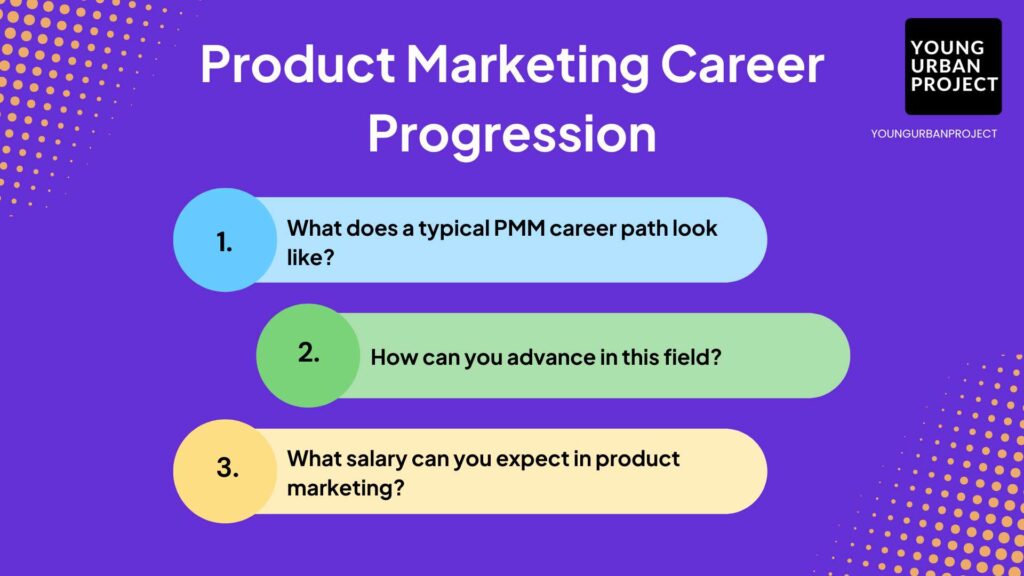
1. What does a typical PMM career path look like?
Product marketing has a clear career path. As you gain experience, you can move into higher roles with more responsibility.
I. Associate Product Marketing Manager (APMM)
This is an entry-level role. You will:
- Support senior PMMs with research, messaging, and product launches
- Work on competitive analysis and positioning
- Collaborate with teams like sales and content marketing
Most APMMs have some experience in marketing, sales, or a related field. Some start as interns before moving into this role.
II. Product Marketing Manager (PMM)
Once you gain experience, you can move into a full PMM role. As a PMM, you will:
- Own go-to-market (GTM) strategies for new products
- Develop messaging and positioning frameworks
- Work closely with sales to create marketing materials
- Analyze customer insights and product performance
PMMs often lead projects and take on more responsibility.
Also Read: What is a Product Marketing Framework?
III. Senior Product Marketing Manager
After a few years as a PMM, you can advance to a senior role. At this stage, you will:
- Lead major product launches
- Set the overall marketing strategy for a product
- Guide junior PMMs and APMMs
- Influence pricing, sales enablement, and customer messaging
This role requires strong leadership and strategic thinking.
IV. Director of Product Marketing
As a director, you will manage a team of PMMs. Your role includes:
- Setting long-term product marketing strategies
- Aligning marketing efforts with business goals
- Working with executives to drive company growth
- Managing budgets and resources
Most directors have at least 7-10 years of experience in product marketing.
V. VP of Product Marketing
At the VP level, you will lead the entire product marketing function. You will:
- Oversee all messaging, positioning, and GTM efforts
- Work with C-level executives on business strategy
- Manage large teams and company-wide initiatives
VPs need deep industry knowledge and leadership skills. Some go on to become Chief Marketing Officers (CMOs).
2. How can you advance in this field?
To move up in product marketing, you need more than experience. You must develop new skills and take on bigger challenges.
Developing leadership skills
As you progress, you will need to manage teams and projects. Build leadership skills by:
- Mentoring junior PMMs
- Leading cross-functional meetings
- Taking ownership of key projects
Good leaders also know how to motivate and guide their teams.
Expanding strategic expertise
PMMs at senior levels need to think beyond daily tasks. They must:
- Align marketing with company goals
- Understand market trends and customer needs
- Make data-driven decisions
Developing strategic thinking will help you move into leadership roles.
Learning from mentors & ongoing education
Many successful PMMs learn from experienced mentors. Find mentors through:
- Networking events
- LinkedIn and industry groups
- Internal company programs
Continuous learning is also key. Online courses, certifications, and workshops can help you stay updated on industry trends.
3. What salary can you expect in product marketing?
Salary for Product Marketing Manager (PMM) roles varies based on experience, location, and company size. According to Indeed, the average base salary for a PMM in the United States is approximately $111,285 per year.
Here’s a general salary range across experience levels:
- Product Marketing Manager (Mid-Level): $68,493 – $180,813/year (Avg: ~$111,285)
- Senior Product Marketing Manager: $152,577/year (Avg)
Again, these numbers vary by industry and region. Tech companies usually offer higher salaries than other industries.
Acing the Product Marketing Manager Interview
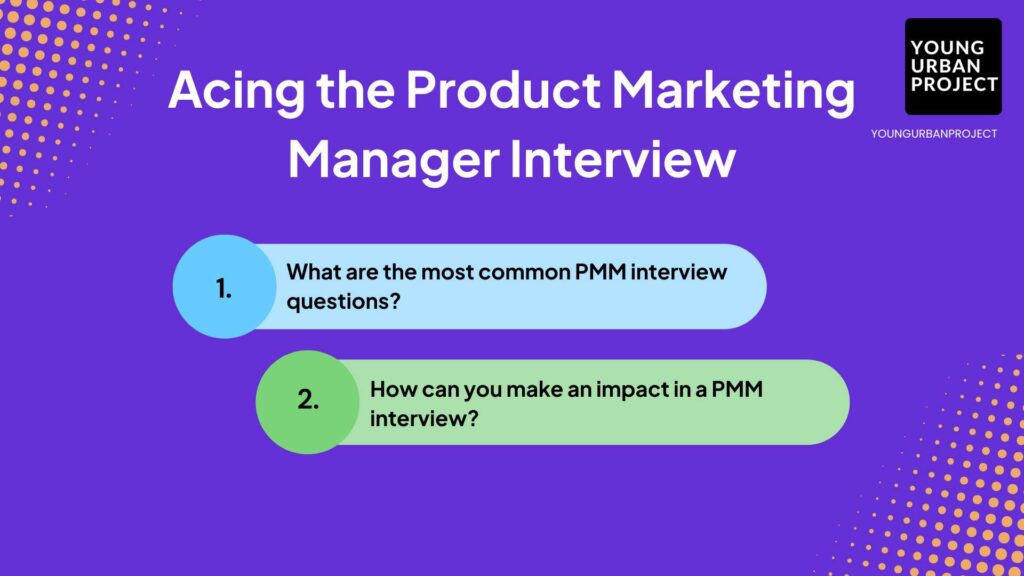
1. What are the most common PMM interview questions?
When you interview for a Product Marketing Manager job, you’ll likely hear some common questions. Be ready to talk about your past.
- Sample Q&A breakdown: Interviewers often ask about what you’ve done before. They might say, “Tell me about a time you launched a product.” Or, “How did you handle a tough marketing situation?” They also want to see how you think. A question might be, “How would you market this new product?” Or, “How would you look at what a competitor is doing?” Have specific stories ready to share.
- Handling case studies & assignments: Sometimes, companies give you a problem to solve. This could be a case study or a task. They want to see how you think on your feet. They might ask you to make a marketing plan. Or, they might want you to look at a market and give your thoughts. If you get one of these, take your time. Explain how you’re thinking. Use facts or logic to back up your ideas.
2. How can you make an impact in a PMM interview?
You want them to remember you after the interview.
- Showcasing a strong portfolio: If you have examples of your work, show them! This could be marketing plans you made. Or blog posts. Or presentations. Anything that shows your skills and what you’ve achieved. Seeing what you’ve done is much better than just hearing about it.
- Demonstrating strategic thinking: Product marketing is about planning ahead. You need to show you can think about more than just today’s tasks. When you answer questions, talk about the big picture. Explain how what you do will help the company reach its goals. Share your reasons and how you would know if you were successful. This shows you’re not just doing tasks. You’re thinking about the overall plan.
Also Read: 11 Great Product Marketing Examples
Final Thoughts
Becoming a Product Marketing Manager is possible with the right steps. It means learning about marketing and products. It also means getting important skills. And it means looking for chances to get experience. The path might be different for everyone. But understanding the market, the product, and the customer is always key. By working on your skills, connecting with people, and showing your interest in product and marketing, you can become a good Product Marketing Manager. Remember to keep trying, keep learning, and be proud of what you achieve. The world of product marketing is exciting and can be very rewarding. It gives you a chance to help bring new and interesting products to people.
FAQs: How to Become a Product Marketing Manager
1. Is product marketing a good long-term career?
Yes, it can be a good career for the long run. Companies will always need people to help them sell what they make. As you gain experience, you can move up to manage teams. You might also get to work on exciting new products. If you enjoy learning and being part of new things, this career can last a while.
2. Do I need a degree to be a PMM?
Often, companies like to see a degree, but it’s not always a must-have. Many PMMs have degrees in marketing or business. But if you have strong skills and can show what you’ve done, you might still get hired without one. If you don’t have a degree, focus on getting experience and proving you have the right skills.
3. How long does it take to break into this role?
Getting a PMM job can take different amounts of time. If you already have some marketing experience, it might take about a year or two of really trying. If you’re starting fresh, it could take longer, maybe two to four years. Learning the skills, meeting people in the industry, and getting some relevant experience will help you get there faster.
4. What industries hire product marketers?
Lots of different types of companies need product marketers. Tech companies hire many. But you can also find these jobs in healthcare, banks, companies that make things people use every day, and more. Any company that makes and sells something needs people to help market it well.
5. How does a PMM differ from a Product Manager?
PMMs and Product Managers work together, but they do different things. Product Managers usually focus on the product itself – what it is, what it does, and how it’s made. Product Marketing Managers focus on who will buy the product, how to talk about it, and how to get it to customers.
6. What certifications are most valuable?
Some certifications can show you have learned specific things about product marketing. Certificates from groups like the Product Marketing Alliance or Pragmatic Institute are often seen as good. But how much a certification helps can depend on the company. Getting the right skills is usually more important than just having certificates.
7. How can I get into product marketing with no experience?
It’s possible to get into product marketing without experience, but you’ll need to work at it. Start by learning as much as you can about it. Look for entry-level jobs or internships in marketing. Try to help with product marketing tasks at your current job, if you can. Creating a collection of small projects or examples of your work can also show employers what you can do.

